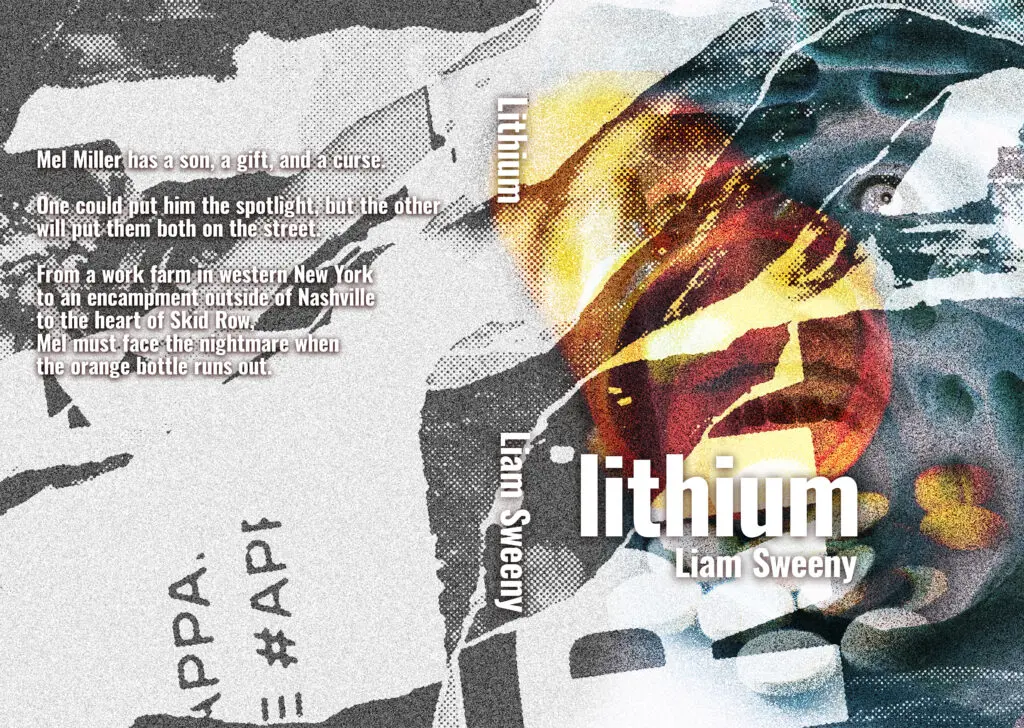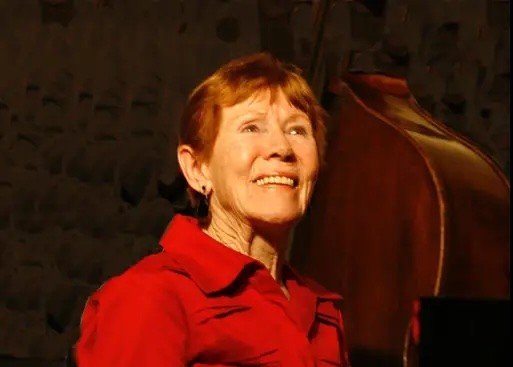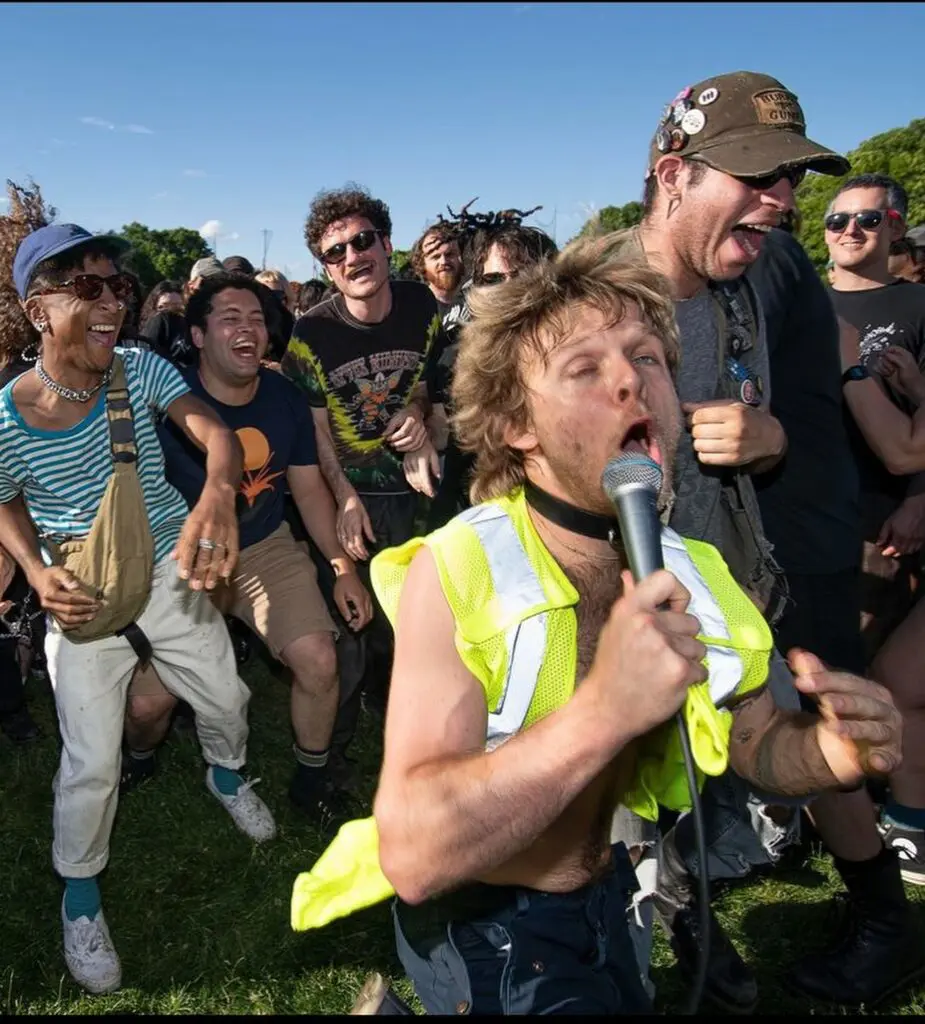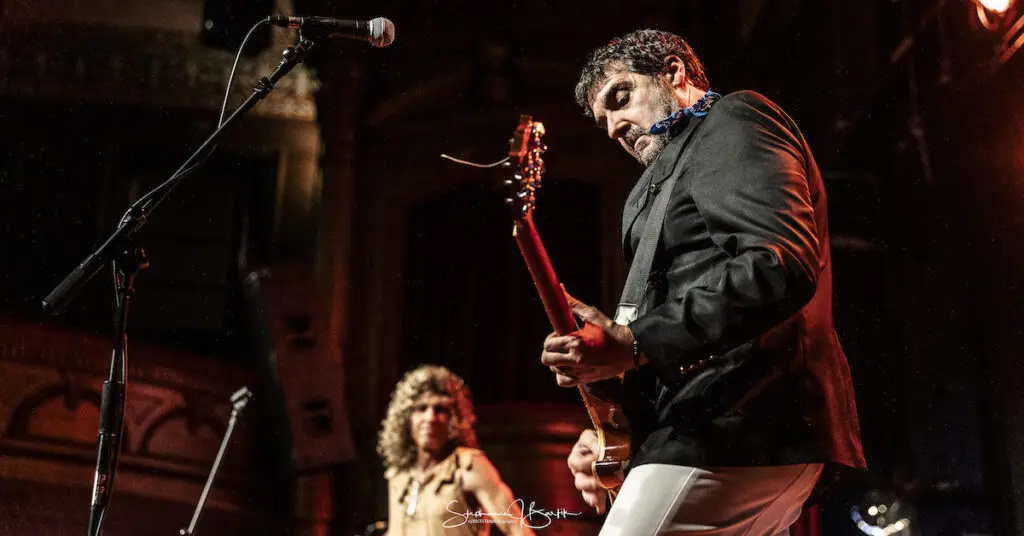Art Along the Aether – Chapter Eight – Xperience Fiction
By Staff on October 15, 2024
Art Along the Aether – Chapter Eight – Xperience Fiction – by Liam Sweeny.
The Gall’ry was a bar once, far from the bar set by a new age of life-high creatives that stood by a chrome lipped mahogany caffeine launch facility. The hiss of milk, whips followed by billows of steam and the clink of ceramic cups collecting mocha and latte flavor coverups of some serious Costa Rican bean.
The barista had twelve arms in motion and two sleeves bearing Juan Valdez-shaped sweat-stains and encyclopedic knowledge of how a hundred or so finicky followers would answer “how would you like it?” Ollie waited until the bar thinned out, smooth, Thorazine jazz coming out of a conspicuous tweed speaker lodged at a forty-five degree angle into the ceiling. Once he had a space where the barista’s attention could be caught, he caught it.
“What would you like?” She said.
“Can I get a large just regular,” Ollie said. Sarah whispered in his ear. “And a macchiato?”
“Sure thing.” The barista spun around the machines she championed like a concert pianist, her work as much a performance as the time Sarah played bass behind her head at the Train Tracks show. It wasn’t want they were used to, the unadulterated smell of coffee, untainted by the smell of the smoked, or the nipped in brought-in bottles. It was clean. It was an environment of stone concentration; even the voices of those lounging around formed a whisper carpet that could’ve floored a library.
“Okay, so a large regular coffee and a Macchiato, anything for your friend?” She aimed her index-finger knuckle at Juli, who shook her head.
“And what books do you need?”
“What huh?” Ollie shrugged his shoulders. “We just need coffee. What books are you talking about?”
“Well, everybody gets a book with their order.” The barista slid forward a slip of paper, a list of books, names recognized, a few; titles, not.
“I don’t want any of these books,” Ollie said. “They look like stuff they make you read in school. Do you have any of Graham Jeffries’ stuff?”
The barista’s face clouded in confusion. “I’ve never heard of Graham Jeffries. What kind of writer is he? What genre?”
“Well, he writes really weird stuff. He lives on Broadway. I bought a couple of his books at a show. We gave him a spot on our merch table.”
“So who publishes him?” The barista said. “Is he in Waterbridge Books?”
“Oh hell no, not Waterbridge,” Ollie said. “I think they put the books together at Laura Mann’s print shop. They got like a thing where they make books. You never heard of it?”
The barista looked like a vast mystery had collapsed to a pedestrian conclusion.
“Oh, he’s self-published.” She said. “That would never be something people would look for in here.” She went back to t6he machinery to take a new order. “The whole point of the books is to give people something to talk about. So we pick books that everybody’s read. I mean, what would be the point of sharing stories people didn’t already know?”
“Why not turn people on to new stuff?”
“Not our place,” the Barista said. “If it’s a good enough story, everyone will be talking about it. And if everyone talks about it, it’ll end up on lists like ours. Your friend just doesn’t have the popularity it needs to be talk of the Gallery.”
Ollie took a sip of his coffee and took a breath, letting out some of his steam.
“So if there was a, like you said, “self-published” book making its way through here, you’d know about it?”
“Probably,” the barista said. “There’s only one front door, and I work every night.”
“So a black book, size of the art paper, stuffed with pages, smelling a little like gasoline and woodfire… never seen it?”
“I’ve never seen that thing.” She said. “And if I did, I’d tell you you won’t find it anywhere our clientele are allowed.”
Ollie and Sarah picked a book off the list and wandered the floor after the odd advisement that no coffee could be returned for having sand in it, the presence of which seemed to be organically sourced from the cracks of the wooden beamed ceiling above. The floor opened into a massive lounge area with mocha carpeting and beige overstuffed couches and chairs. A counter lined the sides of the walls and a stage sat at the back of the floorspace, with a sculpted elevated platform and a spectacle atop it that Ollie didn’t begin to want to process just then, and so he turned himself to more sedate concerns.
A man in a purple turtleneck sweater held his book up and proclaimed, “Suzanne’s pregnancy was a metaphor of the excesses of the roaring twenties!” He proclaimed other gems from the book, not the gems nore the book did Ollie know, but a woman in fishnet stockings and a multicolor silk blouse sidled up and joined him in proclamation of the book’s profundities. Then two more people showed up, and Ollie thought of a story he heard backstage at the Elmore, about how a rooster, in search of hen, started pecking at the empty dirt, whereupon hens would congregate to share the bounty, whereupon the rooster would reap the hen harvest.
Ollie pointed it out to Sarah, and Sarah pointed it out to Juli, and Juli pointed out to the both of then that if they looked around they’d see that the Gallery’s henhouse was hopping. The books may well have been laminated in powdered Rhinoceros horn.
“It’s just a book club,” Ollie said. “Boring.”
“What’s wrong with a book club?” Juli said. “People like to read.”
“These people just want to talk about what they read. Which is boring.”
Juli laughed. “You never talked about some popular show on television?”
“Yeah, but-,”
“So what’s your problem with people having fun?”
Ollie took in 10 more cc’s of coffee. “It just feels fake. There were only ten books on that list. And they were all books that’ve been on those kinds of lists for a hundred years. They couldn’t put new books on there? And you have to take a book if you get coffee. What the fuck is that? So if you haven’t read any of those books you’re automatically assed out?”
“You never read “Moby Dick?” Juli said.
“Who the fuck wants to talk about Moby Dick?” Ollie said. “What’s going to be said that ain’t already been said?”
“Nothing said by you.” Juli replied.
The social circles in the first floor, the literary quoters and the counter-quoters dance in ways not all that dissimilar to the musicians and artists and homesteaders of the warehouse’s first floor, except that at the Gallery sand was falling from between the wooden beams and more people were sitting by the side counters, facing the wall. Maybe their quoting voices were too scratchy. Or maybe they didn’t look the part of the poles of social magnets.
Ollie, Sarah and Juli tried to blend in, but since they held books that they had never read, there wasn’t much they could do other than the mission that put them there. The went further back, as Ollie had remembered that the stairs to the upper floors were placed somewhere backstage. But the spectacle on the stage caught their eyes and put their asses in the audience row.
There were three of them, bounded on all sides by piles of books and canvasses and musical instruments. They were prone doing pushups or reaching high for an iron bar to do pull-ups. On either side were two big, broad, black mustachio’d drill instructors in officers’ caps and onyx aviator sunglasses and thigh-high hooker boots and tight, olive drab shorts, two drill instructors screaming at the three recruits, each with a load fastened onto your backs. One had a net sack filled with books. The other had a myriad of instruments tied to a brace on their back with instrument cabling, and the third had the bulkiest load, at least a dozen eighteen-by-twenty-four canvasses threaded through with binding twine. Sand was pelting their bodies like drizzle.
The drill instructors walked in an out of what best could be considered recruits, slapping two broken-in black leather cat o’ nine-tails across the backs of their legs and shoulders.
The painting recruit groaned as he tried to keep up with his push ups. One of the Dis ran over to him.
“You had enough? That it?” He spit. “All ya gotta do is quit. Cause otherwise you’re getting another Monet.”
“Not another one,” the recruit said. “No more impressionists, please.”
“I’ll give you a Cezanne then. Not an impressionist. You happy, neophyte?”
The recruit cried out. “No please. He learned things from them. Can I just get a Warhol?”
“Jesus dude, chill,” another one of the recruits said. “More you bitch, the longer we all have to do this.”
This outburst engendered quite a cat-whooping from the other drill instructor, who reached into the bookpile.
“So what I’m hearing is, you do want War and Peace. And you want Ulysses too, correct?”
“No sir,” the recruit said. “I’m still working on the inciting incident of the Sound and the Fury.”
“Ain’t that hard,” the DI said. “You should have it by now. Occurs to me thart maybe you just like whoopins and pull-ups. You like whoopins and pull-ups? You wasting our time here?”
“No sir. I’ll have a War and Peace and a Ulysses. And throw in a Dickens.”
The Drill Instructor looked at the recruit hard, and the recruit smiled.
“You better absorb that Sound and Fury, boy,” the DI said. “You’re going to be sweating out a synopsis in five minutes or you’re-,”
He was interrupted by a crash as the recruit strapped with music instruments collapsed. The Drill instructor knelt down and lifted the recruit’s hand. It dropped, but not with a groan.
“This one’s done,” the Drill instructor said to his partner. “Let’s get him unstrapped. We’ll strap up the next recruit.”
“What are we doing with this one?”
“We toss him. He can’t handle the weight, he can’t be here.”
They unstrapped the music recruit and set him in the chair next to Ollie while they went into the crowd, likely to hunt for the next recruit. The recruit rested his elbows on his knees and held his head.
“You okay?” Ollie said.
“No, man. I blew it. I couldn’t take the weight.”
“What did any of that have to do with anything?” Ollie said. “Not criticizing, I’m just asking.”
“You have to be able to take the weight of anything you master. With me, it was instruments. With them, books and paintings.”
“It seems like it would be harder to master an instrument than a book or a painting,” Sarah said. “But what did you get for doing the pushups? Is it like an initiation?”
“Initiation?”
“Yeah,” Sarah said. “You know, like to get into whatever this is. Why else would you do this?”
“I would do it for the sake of doing it. It’s post-art.”
“What the hell is post-art?”
The music recruit reached it hand out toward Ollie, and received Ollie’s coffee in return. “Since everything’s been done before, doing actual art is redundant,” the recruit said. “Same as music and writing. So there’s no point in doing it. But you still need artists, or else it’s just laziness. So we learn how to play and how to write and how to paint and we show it with the stuff the drill instructors strap on us. And instead of doing art, which, as I said, was redundant, we workout with our talents and skills on our backs. It gives people the spectacle they need, and side-benefit is we get stronger.”
Ollie started laughing. Sarah nudged him. Juli seemed enthralled by what was still going on on the stage.
“You gotta be kidding me,” he said. “What’s your name?”
“Sam. Sam Morrow.”
“Well, Sam Morrow, you are a damn fool. What makes you think art is dead? That everything’s been done before?”
“I never used to, not until I started coming here,” Sam said. “But hearing people talk in here, it was like every time I’d come in here excited about something new I’d found, someone would shoot me down with some obscure reference to some writer, some band that had done it before. Eventually, I started to see the truth – that art is dead. Cave people wrote like five sories, grooved on twelve notes and we’ve been re-treading ever since.”
“Sam, I can’t sing any one of my songs the same way twice. And sometimes I sing it off in a way that completely changes the song. You think all art’s been done before, and broad strokes, maybe, but every day the wind blows different than it did before. I heard a punk cover of Brown-Eyed Girl that blew my mind, and that was copying on purpose. Totally different song now.”
“But it’s different for you. You’re Permasoul.”
“Dude, we’re a shitty punk band. I can’t believe people think any way about us here.”
Sam leaned over. “You’re probably the only real band to ever come in here.”
Ollie found the unisex bathroom and with it the back stairway, and he excused himself to leak on porcelain and lean on drywall and when he got in there and the elements aligned he found himself letting go and staring at a landscape that didn’t quite cover the marker graffiti it was intending to. Ollie slipped the picture off the wall and set it down with the hand not aiming. The marker was scratched beyond just covered over, graffiti that had met ardent remediation and didn’t take to it.
Self. It read. We all have ours nurtured or tortured and it makes magic either way. It writes the songs that Tommy sings that define him, endless immaculate parthenogenesis. Ego is the taste of the magic, of the recognition that we can surpass ourselves, surpass God and be our own gods. We fall in love with the signature but chase the name. We’re all terrible players that are faking the game, and when we see the game is more the point than the shiny pieces we hold warm in our hands then we grasp at bure brilliance as it flows through our fingers like sand.
Ollie replaced the picture and washed his hands thrice, once for the waste and twice over simply to waste, and he met Sarah and Juli out in the area between the restroom and the stairs. He looked at the stage, where a new body had replaced Sam and was already piled on with instruments.
“We should just go up there and grab some instruments and just play,” he said. “Bet they won’t stop us. Probably be shocked.
“We can’t,” Sarah said. “We need to get Juli that book. I think it’s upstairs; I mean, it’s not downstairs. We can’t get thrown out.”
“Did it ever occur to your boyfriend that they’re making a statement up there? Post-art is art, you know.”
“Her boyfriend has a name, Juli.” Ollie dipped toward the stage from behind it. “Ollie. O-l-l-i-e. And the whole point of the point of what they’re doing is to train people to not do the thing they’re being trained to do. That’s not art, that’s lunacy.”
“Or maybe you just don’t understand it?”
“Oh, I get it. It’s art. The point is that it’s pointless. You know what? If we jumped in, grabbed some instruments and started jamming out, then it would be another point made. What if we’re supposed to do it? What if, unbeknownst to us, we are a part of the installation, and if we don’t rock the house tonight, the work will be incomplete?”
“I can find the book,” Juli said. “I’ll just tell them I’m Permasoul’s drummer. These people won’t have any idea. Yeah, you all can go.”
Sarah slapped Ollie up the side of his head and cleared her throat. Ollie rubbed the offense.
“Look, I’m just fucking around. We won’t crash anything. Seriously though, why do you care?”
Juli wrapped her arms around herself and scanned the rug for falling sand like Ollie might if he’d dropped a baggie.
“I like this place,” Juli said. “I’m an artist too. And a trained artist, college and everything, not some patchwork Picasso like you and everybody else in that stupid fucking warehouse. This place means something to me, and I’m not going to trash it just because you’re my in.”
They stood still, a lake dark and brooding o’er the beast moving underneath it so broad and so primordial that the surface suffers nay a ripple. Not a word and not a sound between the three as they pondered moving from the ground floor to the one above. The steps were unattended, sand coated and poorly lit, should a poor-sighted patron need to rise to any occasion they’d have to trust their stick.
Ollie gave Sarah a hard side eye.
“You made us get her,” he said. “Come here and hang out with these people who wouldn’t piss our burning bodies out if we begged them, all for her. ‘Patchwork Picasso,’ she’s calling you that too, you know.”
“I know, I know, just… let’s just find that book. I think we have to see what’s upstairs, right? Okay?”
Ollie raised a brow to Juli, who wasn’t noticeably bothered by Ollie’s implication that her trashing of him was an equal trashing of Sarah, her friend, her sole reason for being able to escape the warehouse.
Sarah pushed Ollie aside to go up the stairs, incidentally pushing Juli aside as well. Ollie took his cue and followed behind, and Juli was last up. The sand surged step by step, not having seen a broom or a vacuum, just the prints of designer boots and high-dollar sneakers. The stairway was not but twelve steps and a turnaround with a landing and a diamond-plate door with two tinted windows on it, no handle.
“Just knock,” Sarah told Ollie. “You knock louder.”
Ollie knocked, and got nothing. Then he knocked three times slowly, and he got three knocks back. Ollie wasn’t much for games, except the one where he stood quiet until whoever was on the other side of the door get tired of playing games and got curious about who might be out there. Ollie didn’t see cameras, but it was usually the shitty cameras that were most visible, their strength being only their presence.
“What’s the password?”
“Password?” Ollie said. “You need a password?”
“Some people need a password,” the voice said. “You need a password.”
Ollie crinkled his brow. “How about ‘Fairlane’?”
“Fairlane? Like the car?”
“Yup. Like the car.”
“Who gave you that password?”
“I just made it up.”
“You can’t just make up passwords,” the voice said. “You got to get them from someone.”
Ollie shrugged. “Well, who did you get yours from?”
“We… made it up.”
“Okay, so you give me your password, and I give you mind, and you let us in.”
Ollie heard laughter coming from behind the door. “I wish it worked that way.”
“It works however which way the person holding the door wants it to work,” Ollie said. “That’d be you, chief.”
Silence. Muted words from the other end of the door. Then a crack evolving to a creak and a sliver of light come’ through. A heavyset man in a blue flannel button-down welcomed them in.
“Password was Trumbo,” he said. “Watch the sand.”





 RadioRadioX
RadioRadioX